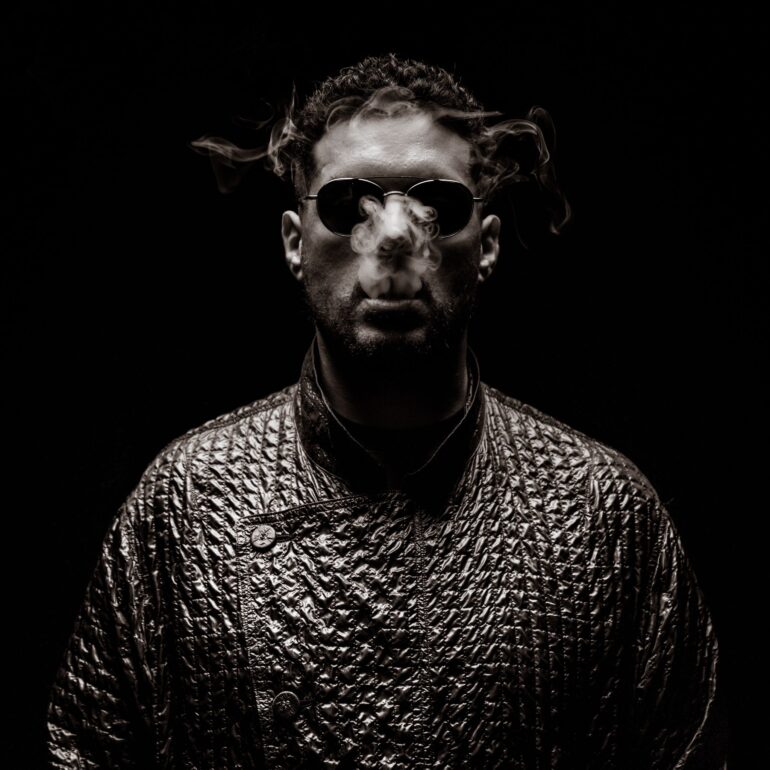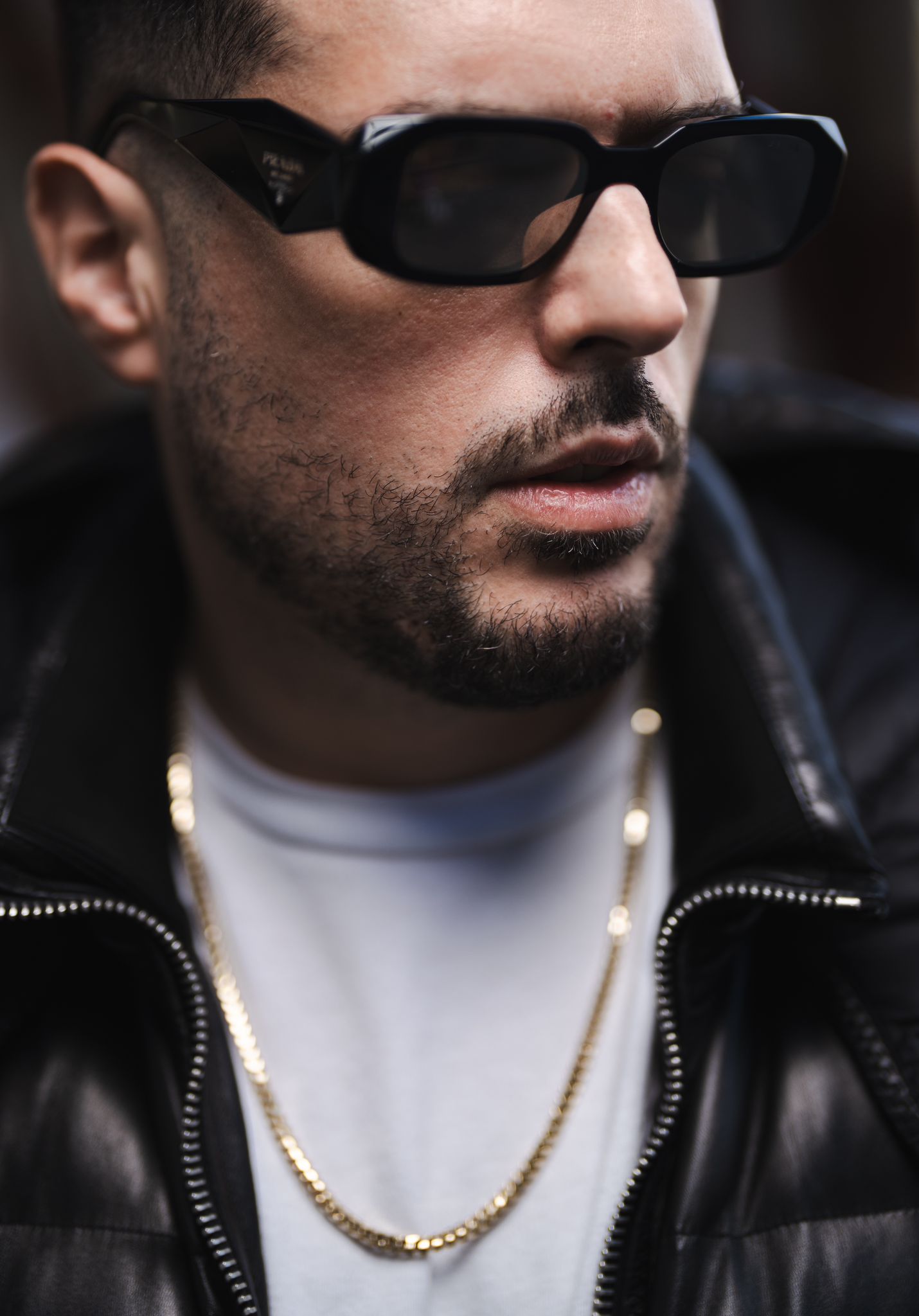Marie: How did you come up with the name Solarrio as your stage name? What does this name mean to you?
Solarrio: The name started as a joke, initially a side project with a friend of mine when we both lived in Berlin. Berlin is very gray and cold most of the year. We both longed for sunshine. We used to work at my apartment, and across the street, there was a tanning salon, a solarium. So we thought, ‘Solarrio’ would sound cool, incorporating the sun and water when you break it down – ‘so la Rio.’ Eventually, I decided to use the name for my solo project.
Marie: That’s a nice fun fact; a good coincidence. And what did you do in Berlin during this time?
Solarrio: I still spend the majority of the year there, even though I move around a lot. Over the years I worked as a producer with many rap artists and singers in Berlin. Eventually, I decided to shift the focus to my own projects and music due to personal reasons. I was in Berlin, taking part of the music industry, touring, and producing records.
Marie: That’s crazy! And is the music scene in Berlin different from France?
Solarrio: Berlin, in Germany, is very electronic-focused, especially with techno. It has a massive club scene, attracting people for days of clubbing. Regarding pop music, Germany, Austria, and Switzerland have their own microcosm where what works there might not resonate elsewhere. This is one of the reasons I wanted to leave, as I felt like I was going in circles. I like funk, R&B. I like house music and stuff, but that’s not what Berlin and Germany are known for.
Marie: Were you living in Paris all your life?
Solarrio: I was born in Paris. My parents are from Argentina and Russia, and they met in Paris. English was my first language since both of them spoke English at home. I spent about 10 years in Paris. My father, along with my entire family, are classical musicians, so I followed them around. My dad spent 15 years in Chicago, but we were also moving back and forth between Paris, Chicago, and later Berlin. I spent two to three months of the year in Chicago, going to school there and returning to Europe. I did that for a few years, then finished school in Berlin and went to college in Boston. So, I’ve been moving around a bit.
Marie: Wow! You’ve been backpacking all your life!
Solarrio: Yeah, pretty much, which is also hard. It’s challenging to find a place to call home since I don’t feel at home anywhere.
Marie: You grew up in a musical family. Did you always know that you would pursue a career in music?
Solarrio: Yes, I knew I wanted to make music from a very early age. As for the career aspect, my entire family is in classical music, which is a different world than the one I operate in, so I had to find my own way.
Marie: Did they always support you when you expressed your desire to pursue this type of music?
Solarrio: Yes, they were always very supportive. Even though they may not have fully understood the genre or the business side of things, they were always supportive. I have to give them credit. Without my family’s blessing, I don’t know if I would be in the position I am today.
Marie: I feel like family support is crucial when pursuing projects.
Solarrio: For sure. Many people don’t have that support, but it can work both ways. Lack of support can drive you to prove others wrong. I’m grateful for the support I received from my parents. It provided a good foundation.
Marie: You’re known for mixing synthpop, funk, R&B, and hip-hop production. Who are and were your biggest inspirations?
Solarrio: My biggest inspirations are mostly from 80s R&B music, such as Prince, Michael Jackson, Jimmy Jam, Terry Lewis, Solar Records and various funk, R&B acts from the era. Deciding to create this kind of music was natural since it’s what I personally enjoy listening to. When I started my own project, I experimented with this direction, but with my first album, I focused on consolidating it into one cohesive style, leaning towards electrofunk and R&B. It came organically, inspired by a list of songs that influenced me. I go into the studio, listen to music for about half an hour to get in the zone and then create without overthinking.
Marie: As someone not in the music industry, isn’t it hard not to copy the music and beats of your biggest inspirations?
Solarrio: It’s a process. In the beginning, you tend to copy and emulate a lot. However, over time, your own style naturally develops, inspired by your influences. No one is 100% original, from scratch. You take influences, mix them up, and eventually, your unique style emerges.
Marie: How would you explain your thoughts and music production process?
Solarrio: Writing is more challenging for me because of high expectations, but making beats comes naturally. I often start with the instrumental, then develop a melody or top-line melody before finding suitable words. It’s about making the words meaningful and coherent with the overall concept. I prefer writing with others to feed off their ideas. Sometimes the process flows freely, and the best songs come effortlessly. When things feel forced, it’s a sign to take a break and return with a fresh perspective.
Marie: Do your songs sometimes pop up in your head, and then you write them down?
Solarrio: I keep a notes section where I jot down sentences or song ideas when they come to me. Later, in the studio, I revisit these notes and see how I can incorporate them into the songs I’m working on. There’s no blueprint; sometimes, I start with lyrics, and other times, I begin with the music and add lyrics afterward, depending on what feels more natural.”
Marie: I saw that your music is listened to in more than 133 countries. Many countries seem to enjoy your songs. Which country stood out for you?
Solarrio: I would say Poland? have a lot of listeners in Poland for some reason, but my main listeners are in the USA, Mexico, Brazil, and many countries in Latin America. They seem to be very receptive. Maybe I need to start singing in Spanish, you know?
Marie: You just announced your new song release “She Goes.” Could you tell us a little bit more about how this song came to life and what the meaning behind it is?
Solarrio: The story behind it is basically that I was in a studio with my co-producer and a friend. We were trying to get inspired, and he put on the TV, showing a fashion show.As he did that, I played a beat that I had already made for something else. Hearing that beat with the fashion show was perfect. It was so inspiring. We wrote the song about celebrating women of different types, just kind of going with the flow. It wasn’t a scientific experiment; we watched it, the first few lines came out, and we wrote along with that. The chorus goes, ‘she goes.’ Originally, it was called ‘she goes dumb,’ which is a slang term from California, meaning going crazy and letting yourself go.
Very often, it’s good to have something visual to go with your music because nowadays, especially with social media, you need a visual element. Music has become very visual. People discover songs on TikTok or Instagram, and having a visual adds value.
Marie: I could see that you like to travel the world. Would you like to perform in other countries? And with whom?
Solarrio: Well, obviously, I’d love to perform more in the US. This year, I’m actively trying to perform in Mexico, Brazil, and I have some shows in Spain coming up, possibly in Barcelona and Madrid. As for collaborations, there are so many people. At this point in my life, I want to bring people into my world musically, rather than trying to work within someone else’s style. I have a certain style of music I want to make, and I want to bring others into that world, even if it’s someone like Rihanna, and have her make a song in the style I create, rather than trying to tailor it to what people expect them to do.
Marie: Yeah, it’s more about attracting the right people.
Solarrio: Exactly, it has to fit together. There’s a lot of music I like personally that does not fit with my music. So I admire it from a distance, but I don’t want to bring it into my work. I still work a lot with rap artists out here in California, making rap music, but my own music is a bit different.
Marie: Are you producing and writing all of your songs?
Solarrio: I do, but I also like to bring co-writers and co-producers into the mix to bring a fresh perspective.
Marie: Where do you see yourself five years from now?
Solarrio: My main goal this year is to release my debut album. I’m contemplating thinking outside the box because everyone just puts something out on streaming platforms. So I’m thinking about maybe putting out the whole album for sale on one platform, while releasing it song by song on Spotify and Apple Music. So if you want the whole album now, you can buy it, or you can wait for it. I have a lot of music coming out this year, and my main focus will be on performing and playing live more.
Marie: What does true urban culture mean to you?
Solarrio: I guess it’s whatever the youth movement is in the city, whatever the youth are into.
Marie: Anything to add?
Solarrio: Certainly! I’ve had the pleasure of collaborating with some incredible artists. One notable collaboration is with Holland, also known as Holland and ICC. We worked together on a song for my project called ‘And I Love.’ I have a close working relationship with Holland, and he has a couple of exciting projects coming out this year. Another talented artist I’ve worked with is Xavier Top Floor, for whom I’ve produced a significant portion of his upcoming album. Besides these collaborations, I’m continuously working on my own music. If you enjoy my sound, expect to see consistent releases. I took a bit of a break during the pandemic, but that won’t happen again. We’re back on track, and it feels like we’re just getting started. So, stay tuned!





